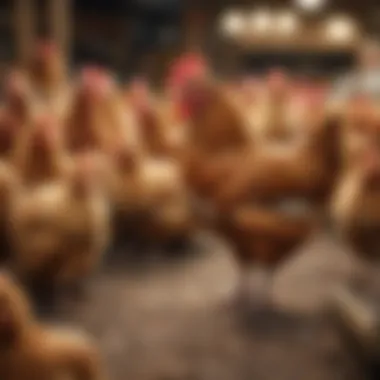Where to Buy Young Chickens: A Complete Guide


Intro
Purchasing young chickens is an important decision for any aspiring poultry keeper. It is essential to explore various avenues where one can find healthy birds, while also paying close attention to the breed, health, and legal considerations. This guide aims to provide an informative overview as individuals embark on this new journey.
Local Options
When looking for young chickens, local sources often provide the most direct and reliable options. Farmers' markets or local feed stores frequently have chicks available for sale. Here, buyers can also ask questions and gather firsthand information about the chickens' upbringing.
Another option includes contacting local hatcheries. They specialize in breeding and raising a variety of chicken breeds, ensuring healthy stock. Visiting these facilities can also give the buyer an opportunity to inspect the environment in which the chicks were raised.
Connecting with local chicken enthusiasts through community groups on platforms like Facebook or Reddit can lead to valuable recommendations. Many members may have chicks for sale or could direct you to trustworthy suppliers.
Online Platforms
The internet has expanded access to various sources for purchasing young chickens. Many reputable online hatcheries offer delivery options. For instance, Murray McMurray Hatchery and Cackle Hatchery are popular choices with wide varieties. It's important to research reviews and ensure these platforms comply with health and legal standards.
Potential buyers should be mindful when using online marketplaces. Sites like Craigslist and eBay can connect buyers with sellers in their area, but the buyer assumes the risk of unknown quality. A thorough screening process is necessary to ensure the chickens are healthy.
Breed Selection
Choosing the right breed is critical. Different breeds serve different purposes, such as egg production or meat production. Some breeds are friendly and make good pets, while others may have unique care requirements. It is advisable to research various breeds extensively. Knowledge about the expected productivity, temperament, and any special needs of each breed will aid in making an informed decision.
Health Checks
Before finalizing a purchase, prospective chicken owners should perform health checks. This includes examining the chicks for signs of illness, such as lethargy, abnormal breathing, or a droopy appearance. A reputable seller should provide health documentation for their chicks.
In addition, understanding local regulations concerning poultry ownership is essential. Different areas may have specific laws regarding the keeping of chickens, including zoning laws and permits.
Closure
In summary, obtaining young chickens involves careful consideration of the sources and the breeds chosen. Local options like feed stores and hatcheries offer direct purchase opportunities. Online markets expand choices but come with increased caution. Ultimately, informed decisions based on health, breed, and legal standards are key to successfully starting a poultry endeavor.
Understanding Young Chickens
Understanding young chickens is a fundamental aspect for anyone considering raising poultry. This section provides vital insights that will benefit both novice and experienced chicken keepers. Grasping the specifics of what constitutes a young chicken and the varied breeds available lays the groundwork for successful acquisition and care. Additionally, knowledge about age ranges and breed traits influences buyer decisions, thus ensuring healthier livestock and more productive outcomes.
Definition and Age Range
Young chickens, often referred to as ‘chicks,’ are typically defined as birds that are under the age of six months. They go through distinct developmental phases. Initially, they are hatched from eggs and categorized as hatchlings during the first week of life. Following this, they enter the chick stage, which lasts until they are about six weeks old. From six weeks to approximately five months, they are classified as pullets if female and cockerels if male.
Understanding these classifications allows prospective buyers to select the appropriate age based on their intended purpose, whether for egg production or meat. It is essential to assess their development for health indicators and vitality. While young chickens grow rapidly and adapt to their environments, each age group presents unique challenges and requirements in terms of feeding, housing, and health management.
Choosing the Right Breed
The selection of the right breed is crucial when buying young chickens. Different breeds have varying temperaments, growth rates, and purposes. For example, if the intention is to raise chickens primarily for eggs, one should consider breeds like the Leghorn or Rhode Island Red because of their prolific laying capacities. Alternatively, for those interested in meat production, broiler breeds such as the Cornish Cross are commonly preferred due to their efficient growth.
Moreover, some breeds are more suited to specific climates and conditions. For instance, heritage breeds often adapt better to free-range living. It is beneficial to research each breed's characteristics and requirements. Similarly, consider whether the breed aligns with your goals, whether that is for companionship, farming, or show purposes. Ultimately, the right choice leads to a more fulfilling experience in raising chickens.
Local Farms and Hatcheries
Local farms and hatcheries are crucial sources for those looking to purchase young chickens. They provide a more personalized experience and often offer varying breeds that suit different needs. By obtaining chickens from these local entities, buyers gain several advantages, including the opportunity to see the conditions in which the birds are raised. This transparency can ensure health standards and better animal welfare practices.
Finding Nearby Farms


To locate nearby farms, one can start by utilizing online tools and networking within the community. Websites that list local farms can serve as valuable resources. Search engines can help, but social media platforms like Facebook often have groups dedicated to local agriculture or poultry raising. Additionally, visiting local farmer's markets can yield contacts for nearby farms that may not be heavily advertised online. Some unique advantages of finding local farms include:
- Direct Purchase: It allows buyers to acquire chickens firsthand and understand their upbringing.
- Local Knowledge: Farmers can provide insights regarding breeds suitable for local climates or conditions.
- Community Engagement: Building ties within the community can lead to future opportunities for support and resources.
Hatcheries: A Closer Look
When considering where to buy young chickens, hatcheries can be an excellent option, especially for those seeking specific breeds.
Reputable Hatchery Indicators
Reputable hatcheries often showcase certain indicators that distinguish them from less reliable sources. One primary characteristic is the availability of health certifications. These certifications assure buyers that the chicks have been vaccinated and raised in sanitary conditions. Another indicator to consider is customer reviews on forums like Reddit. Positive experiences shared by others can highlight a hatchery's reliability. The unique feature of reputable hatcheries is their commitment to biosecurity practices. This minimizes the risk of disease transmission and ensures healthier chicks overall.
Reviewing Hatchery Practices
Reviewing hatchery practices is vital in assessing a hatchery’s commitment to ethical breeding. Important aspects to consider include their procedures for chick care, nutrition, and living conditions. Many reputable hatcheries will publish their practices, demonstrating transparency. A beneficial part of this review process is the potential to ask questions directly to hatchery staff. This interaction can provide deeper insights into ethical practices and overall quality of chickens offered. Understanding hatchery practices can significantly influence the buyer's decision-making process as it offers a lens through which overall animal welfare can be judged.
A thoughtful approach to buying young chickens underscores the importance of selecting a trustworthy source, ensuring a positive experience for both the birds and their owners.
Online Retailers
The emergence of online retailers represents a significant shift in how individuals acquire young chickens. Convenience, variety, and accessibility characterize this new shopping paradigm. Unlike local farms or hatcheries, online platforms allow buyers to browse selections from the comfort of their home. This section outlines key aspects of purchasing chickens from these online sources, focusing on popular marketplaces and specialty websites that cater specifically to poultry enthusiasts.
Popular Online Marketplaces
Several well-known online marketplaces offer young chickens for purchase. Platforms like eBay, Amazon, and Craigslist can be valuable resources for buyers looking for convenience. Listing a diverse range of breeds, these sites allow you to compare prices and availability seamlessly. However, it is essential to approach these marketplaces with caution.
- Verification of sellers is crucial. Look for reviews and ratings associated with each seller.
- Understand the legalities surrounding poultry shipping in your area. Some states have restrictions that might affect your purchase.
- Communicate clearly with sellers to confirm the health and treatment of the chickens they sell. Many online marketplaces have policies for returning unhealthy animals.
These factors ensure that your online buying experience is smooth and secure.
Specialty Poultry Websites
Specialty poultry websites provide a focused and comprehensive selection of young chickens. These sites tend to specialize in various breeds, often offering in-depth information on each type. They typically trap a niche audience looking for specific features. The benefits of using these sites extend beyond mere selection.
Features of Specialty Sites
One key aspect that distinguishes specialty poultry websites is their focus on quality and breed-specific information. Buyers receive access to resources like care guides, breed comparisons, and breeder backgrounds. This knowledge is invaluable for making informed decisions. Furthermore, these sites often have strict vetting processes for the sellers they feature.
- Unique Selection: Specialty sites frequently offer rare or heritage breeds that mainstream marketplaces do not carry.
- Expertise: They often provide experts' advice, enabling buyers to ask questions and receive tailored support.
Choosing to purchase from these sites is beneficial for discerning buyers seeking specific breeds with thorough care information.
Shipping Considerations
Shipping is a critical aspect when purchasing young chickens online. Many people overlook the importance of this element. Specialty poultry websites usually have detailed shipping policies that outline how they ensure the safe transport of live animals.
- Shipping Delays: Understanding potential delays can save buyers from stress. Special arrangements often need to be made to ensure that young chickens arrive healthy.
- Temperature Control: Many sites implement measures to ensure packages are temperature-controlled during transport, which is vital for the chickens' health.
In summary, when considering online options for purchasing young chickens, remember that both popular marketplaces and specialty sites offer unique advantages and important factors to consider. Shoppers must weigh convenience against the reliability and welfare of the chickens being purchased. By doing this, they can make informed decisions that align with their goals, whether for raising chickens for eggs, meat, or companionship.
Local Agriculture Shows and Events
Local agriculture shows and events provide valuable opportunities for potential chicken buyers. These gatherings often showcase various breeds and allow for firsthand interaction with experienced breeders. Understanding the significance of these events enhances the reader's ability to make informed decisions regarding the purchase of young chickens.
Benefits of Attending Shows


Attending local agriculture shows offers several benefits for those interested in buying young chickens. First, it allows buyers to view a variety of breeds up close. This is crucial for those unsure about which breed suits their needs. Additionally, buyers can see the conditions in which the chickens are raised. This insight is important for assessing health and quality.
Another benefit is the opportunity to attend educational workshops. Many shows feature presentations about proper chicken care, breeding techniques, and disease prevention. Such information is advantageous for both novice and experienced chicken keepers. Networking opportunities abound as well. Meeting other enthusiasts or local farmers can lead to future friendships and contacts. Buyers can also find lesser-known but reputable sellers who may not have an online presence.
Networking with Breeders
Local agriculture shows create a unique environment for networking with breeders. Establishing these connections can improve the buying experience significantly. Interacting with breeders in person allows for deeper discussions about specific breeds and their care requirements. Buyers can ask direct questions, fostering an understanding that may not be achieved through online communication.
Another advantage is the possibility of receiving special offers or discounts. Some breeders may provide deals only available at the event. Furthermore, networking could lead to access to future events or even private sales, which can be beneficial for acquiring specific breeds or bloodlines.
Consider taking notes during conversations with breeders. Documenting insights and contact information can help in making informed decisions later. Overall, these interactions can earn buyers trust in their selected sellers, ensuring a better purchasing experience.
Factors to Consider Before Purchase
Before embarking on the journey of buying young chickens, it is essential to evaluate several key factors. This preparation can determine not just the success of your endeavor but also the health and well-being of the chickens. Understanding these factors will help ensure a smooth transition into chicken raising.
Health and Wellness Checks
Health checks are paramount when considering young chickens. It is essential to ensure that the chickens you are buying are free from illnesses. Look for signs such as active behavior, bright eyes, and clear breathing. If possible, request a health certificate from the seller. This document can validate that the chickens have undergone necessary veterinary inspections.
Additionally, familiarize yourself with common diseases. These include respiratory issues or parasites like mites and worms. Knowing the symptoms can help you make informed decisions and prevent buying unhealthy stock. A healthy chicken begins with a good start; the initial purchase marks the first step toward a productive flock.
Legal Requirements and Permits
Legal compliance is often overlooked, yet it is critical in chicken ownership. Depending on your location, there may be specific regulations governing the keeping of chickens. It is wise to research these requirements thoroughly.
Understanding Local Regulations
Understanding local regulations is crucial for anyone interested in raising chickens. Each region has its requirements, which may include zoning laws and restrictions on the number of chickens you can keep. Complying with these laws minimizes the risk of conflicts with neighbors or local authorities. A key characteristic of these regulations is that they often aim to ensure animal welfare and community standards.
Furthermore, knowing these regulations in advance can save you from potential legal issues. Communities that embrace chickens often have regulations that promote healthy relationships between chicken owners and their neighbors. This proactive approach could be seen as beneficial, as it fosters a positive community environment.
Necessary Documentation
Necessary documentation can vary widely. You might need permits before bringing home chickens. This documentation typically includes registration forms or health certificates, depending on your area’s rules. Obtaining these papers is a key step in establishing your compliance and reliability as a livestock owner.
The unique feature of necessary documentation is that it often represents accountability. By showing that you have complied with the required paperwork, you not only protect yourself legally but also reassure neighbors about your commitment to responsible chicken keeping. Yet, be aware; in some areas, the documentation process can be time-consuming. It is wise to plan ahead to avoid delays in bringing your chickens home.
In summary, thorough health checks and an understanding of legal requirements are critical steps before purchasing young chickens. These factors ensure a healthy start for the chickens while promoting responsible ownership in the community.
Financial Implications
Understanding the financial implications of purchasing young chickens is essential before embarking on this venture. It is not merely about the upfront cost of acquiring the birds; several long-term expenses require consideration. The importance of budgeting cannot be overstated, as it influences the sustainability of chicken keeping. For many, young chickens represent a potential source of fresh eggs or meat, but careful planning surrounding financial outlays ensures that these goals are achievable.
Cost Analysis of Young Chickens
When looking at costs, the price range of young chickens can vary significantly based on several factors. On average, you may expect to pay anywhere from $3 to $30 per chick, depending on the breed and where you purchase them. Local farms and hatcheries may have reasonable prices, but they can differ from online retailers. It's helpful to research various sources to find a competitive price on chicks. Some higher-end or rare breeds might incur elevated costs due to their unique characteristics.
Additionally, costs associated with the purchase don't end with the chicks themselves. Supplies such as feeders, waterers, and bedding materials should be factored into the initial outlay. Therefore, having a comprehensive cost analysis upfront can help set realistic expectations.
Budgeting for Maintenance
This ongoing expense is often underestimated by new chicken owners. Significant ongoing costs include feed, utilities, and healthcare for your flock.
Feed and Utilities


Prevailing knowledge suggests that feed is one of the primary expenses in chicken keeping. Chickens typically consume about 0.25 pounds of feed per day. Different types of feed, such as layer pellets for egg-laying hens or starter feed for chicks, can affect your budget. The cost of feed may also vary based on quality. Investing in high-quality feed can lead to better health and productivity in your flock.
Utilities also factor into the overall cost. If you provide heat during colder months or use electric lights to boost production, these costs can accumulate. It is prudent to consider energy-efficient heating solutions to manage these expenses effectively.
Health Care and Cage Costs
Investing in the health and welfare of your chickens is vital. Regular veterinary checks and vaccinations should be a part of your budget plan. Routine health checks ensure early detection of any health issues, possibly saving money in the long run.
Moreover, cages and housing are significant components of maintenance. Whether you opt for mobile coops or fixed structures, ensuring they are secure and comfortable protects your investment. Building shelters may require an upfront investment, but they contribute to the overall well-being of the chickens. The unique feature of good housing is that it prevents possible losses from predators and disease, making it a wise investment in the long run.
Proper financial planning can make the transition into owning chickens not just feasible but also enjoyable.
Tips for a Successful Purchase
Purchasing young chickens requires careful planning and consideration. This section offers practical strategies that can significantly impact the success of your acquisition. By focusing on research and communication, potential buyers can mitigate risks, ensuring they secure healthy chickens and reputable vendors.
Conducting Research
Prior to making a purchase, conducting thorough research is essential. Understanding the local market, available breeds, and seller reputation can save time and resources. Potential buyers should explore various sources, including local poultry clubs, online forums, and social media groups dedicated to poultry enthusiasts.
This research should also extend to learning about the breeds themselves. Different breeds have unique traits, including growth rates, egg production, and personality. Knowing these factors aids in selecting chickens that align with your specific needs, whether for eggs, meat, or pets.
Establishing Contact with Sellers
Once adequate research is conducted, reaching out to sellers is the next step. Communication establishes rapport and clarifies any concerns about the chickens. It also helps gauge the seller's experience and knowledge, which can influence the selection process.
Questions to Ask
When contacting a seller, asking the right questions is crucial. Inquiries about the chicken's age, health history, and vaccination status should not be overlooked. These questions provide insight intothe overall well-being of the chicks.
A beneficial aspect of this questioning is that it allows buyers to understand the seller’s breeding practices. This knowledge is essential, as it impacts the likelihood of acquiring healthy chickens. Moreover, asking specific questions can reveal potential red flags in seller credibility, which is critical to avoid future issues.
Assessing Seller Credibility
Assessing seller credibility is a vital process in ensuring a successful purchase. It involves evaluating reviews, social media presence, and feedback from previous customers. A reputable seller often has a solid social media presence where happy customers share their experiences.
Key characteristics of a credible seller include transparency and willingness to share information about their breeding practices. They should provide documentation when requested, assuring buyers of the chickens' health and lineage. Moreover, finding testimonials and engaging with past customers can offer significant benefits, as it reflects accountability.
By employing these strategies and maintaining a diligent approach to research and communication, the likelihood of successful poultry purchase increases significantly.
Post-Purchase Care
Post-purchase care for young chickens is crucial for their overall health and well-being. This phase can significantly influence their growth and productivity. Proper care ensures that chickens remain healthy, laying healthy eggs or growing efficiently for meat. It often involves providing a suitable environment, adequate nutrition, and preventive healthcare.
Setting Up a Comfortable Habitat
Creating a comfortable habitat for young chickens is essential. The environment can impact their stress levels and overall development. Start by selecting a well-positioned coop that provides enough space. A good rule of thumb is about 2 to 4 square feet per chicken in the coop and 8 to 10 square feet in an outdoor run.
Ensure proper ventilation to keep the air fresh. Stale air can cause respiratory issues and stress in young chicks. Using proper bedding, such as straw or wood shavings, can help maintain a dry and clean space.
Also, think about temperature control. Young chicks are particularly sensitive to temperature fluctuations. Keeping the area warm initially, and gradually allowing them to acclimatize to cooler temperatures is important.
Health Management Practices
Health management starts from day one. It is vital to have a routine that includes vaccinations and regular health checks. Young chickens are susceptible to diseases. Therefore, keeping a clean environment is essential. Regular cleaning of the coop, feeding area, and water containers can prevent illness.
Monitor for signs of distress, such as lethargy or a change in eating habits. Sudden changes can indicate health issues.
Feeding balanced nutrition is another important facet. Quality feed should meet their specific needs. Different breeds may have unique requirements. Supplementing their diet with vitamins, minerals, and occasional treats can boost their health.
In summary, effective post-purchase care involves setting up comfortable living spaces and implementing solid health management practices. These steps are essential for ensuring that your young chickens thrive in their new home.







